Walking in the Footsteps of Apostle Paul: Athens and Corinth!
Discover where Apostle Paul preached in Athens and Corinth. Explore biblical sites, historical context, and how his message shaped early Christianity in Greece.
Apostle Paul’s Missionary Journey to Athens and Corinth: Standing in the shadow of the Acropolis or gazing across the ruins of ancient Corinth, it’s easy to imagine the apostle Paul walking these very paths nearly 2,000 years ago. During his second missionary journey, Paul visited Athens and Corinth, two of the most influential cities of the ancient world, each playing a pivotal role in the spread of early Christianity.
Tour ID
- Tour type: Small group semi-private shore excursion, semi-private tour
- Maximum participants: 19 people
- Duration: Half day / 4 Hours
- Destinations: Athens and Ancient Corinth
- Region: Attica, Peloponesse
- Starting Point: Piraeus Cruise Port, Athens
- Tour Language: English
- Age Range: 1 to 99 years old
- Available: All year round
- Departures: Daily
As your cruise ship docks in the historic port of Piraeus, your Athenian adventure begins with a warm welcome from our friendly local team, waiting just steps from your ship. From there, you’ll step into comfort aboard a sleek, air-conditioned Mercedes-Benz vehicle, ready to transport you through time, culture, and faith.
In Athens, the cultural and intellectual heart of the Greco-Roman world, Paul boldly shared the gospel on Mars Hill (Areopagus), engaging with philosophers and challenging their views with the message of the “unknown God.”
In Corinth, a bustling port city known for its wealth and immorality, he stayed for over a year, planting one of the early Christian churches and writing letters that would become part of the New Testament.
This journey wasn’t just geographical but spiritual, cultural, and deeply impactful. Today, travelers and pilgrims retrace Paul’s steps in Greece to connect with the biblical narrative, explore archaeological sites, and reflect on the enduring power of his message.
Paul in Athens (Acts 17:16–34)
- Stirred by Idolatry in the City
Upon arriving in Athens, Paul was deeply distressed by the city’s devotion to idols. Athens, renowned for its art, culture, and philosophy, was also filled with temples and altars to various gods. His spirit was moved, and he was compelled to speak out.
“While Paul was waiting for them in Athens, he was greatly distressed to see that the city was full of idols.” (Acts 17:16)
- Reasoning in the Synagogue and Marketplace
Paul engaged in daily discussions with Jews in the synagogue and with both philosophers and common people in the Agora, the central marketplace of Athens. He debated with Epicurean and Stoic philosophers, who were intrigued—and skeptical—about this new teaching. - The Areopagus Sermon
Paul was invited to speak at the Areopagus (Mars Hill), a prominent council and public forum near the Acropolis. Here, he delivered one of his most famous sermons, contextualizing the gospel message for a pagan audience.
“Men of Athens, I see that in every way you are very religious… what you worship as something unknown I am going to proclaim to you.” (Acts 17:22–23)
- A Mixed Response
The crowd’s reaction was divided—some mocked the idea of resurrection, while others were intrigued. A few, including Dionysius the Areopagite and Damaris, believed and joined Paul.
Paul in Corinth (Acts 18:1–17)
- Strategic Mission Field
After Athens, Paul traveled to Corinth, a wealthy, cosmopolitan port city known for its immorality and diversity. Corinth was a commercial hub connecting northern and southern Greece—an ideal location for spreading the gospel. - Tentmaking with Aquila and Priscilla
Paul worked as a tentmaker alongside Aquila and Priscilla, fellow Jewish believers who had recently come from Rome. This bi-vocational approach helped support his ministry and connect with locals. - Preaching in the Synagogue
As in other cities, Paul began his ministry by preaching in the synagogue to the Jewish community. Over time, he faced opposition and turned his focus to the Gentiles.
“Your blood be on your own heads! I am innocent. From now on I will go to the Gentiles.” (Acts 18:6)
- Vision of Encouragement from the Lord
While in Corinth, Paul received a vision from God encouraging him to continue speaking boldly:
“Do not be afraid; keep on speaking, do not be silent. For I am with you…” (Acts 18:9–10)
- Founding the Corinthian Church
Paul stayed in Corinth for 18 months, one of his longest stays in any city. He founded the church in Corinth, later addressing its challenges in 1 & 2 Corinthians, letters that are now part of the New Testament. - Bema Seat and Gallio’s Judgment
Paul was brought before Gallio, the Roman proconsul, at the Bema seat—a public judgment platform. Gallio dismissed the charges, setting a legal precedent that helped protect Christian preaching in the Roman world.
Spiritual and Historical Significance
Athens represents the challenge of sharing the gospel with intellectual and skeptical audiences.
Corinth represents the power of grace to transform a morally corrupt culture and build a strong Christian community.
Together, these two cities show Paul’s adaptability, boldness, and commitment to planting churches in strategic urban centers.
Visit Acropolis and the Parthenon
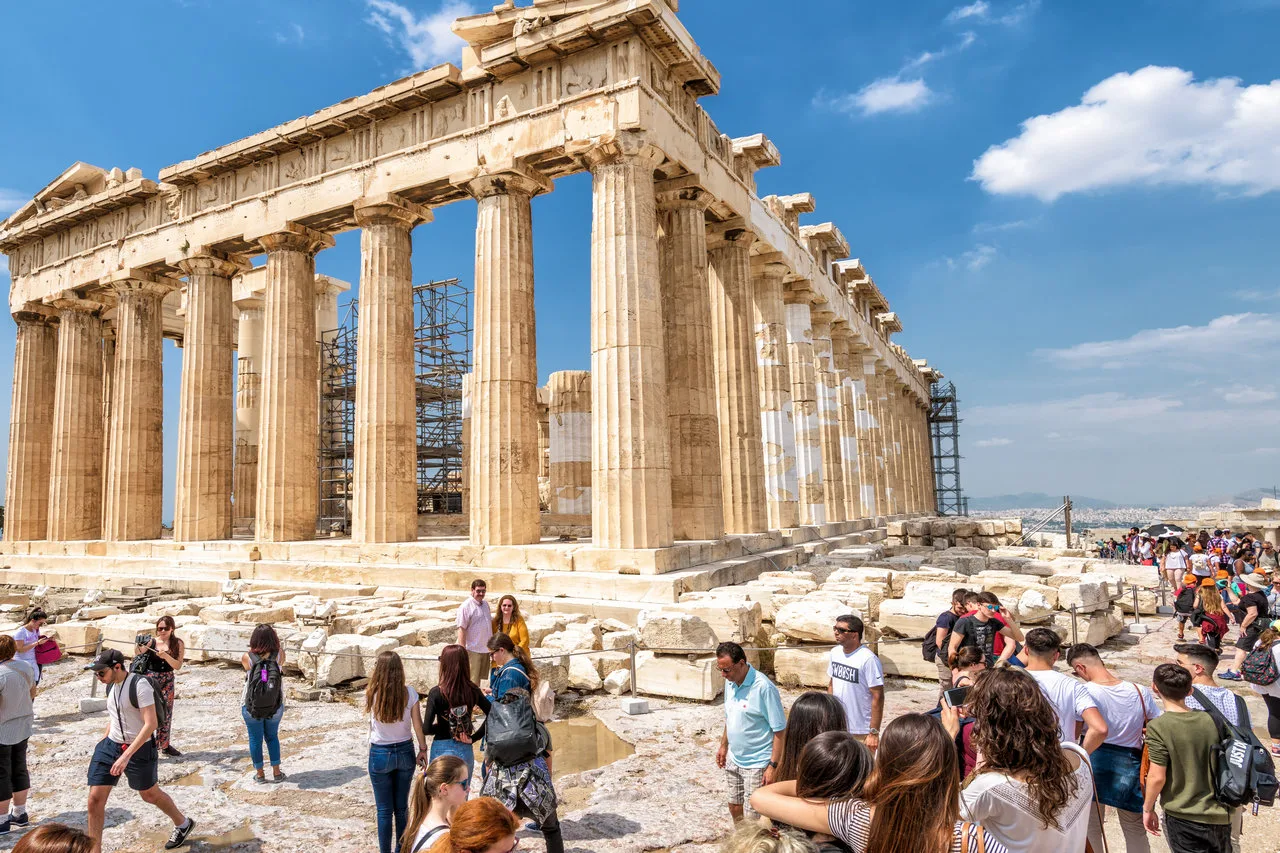
Early in the morning your driver will pick you up from your hotel or cruise ship and we will begin your tour in Athens, the birthplace of democracy and the heart of ancient Greek culture.
Visit the iconic Acropolis, a UNESCO World Heritage Site that stands as a symbol of the city’s rich history. Here, you’ll find the Parthenon, a magnificent temple dedicated to the goddess Athena, as well as other remarkable structures like the Propylaea, the Temple of Athena Nike, and the Erechtheion.
Walking On the Footsteps of St. Paul
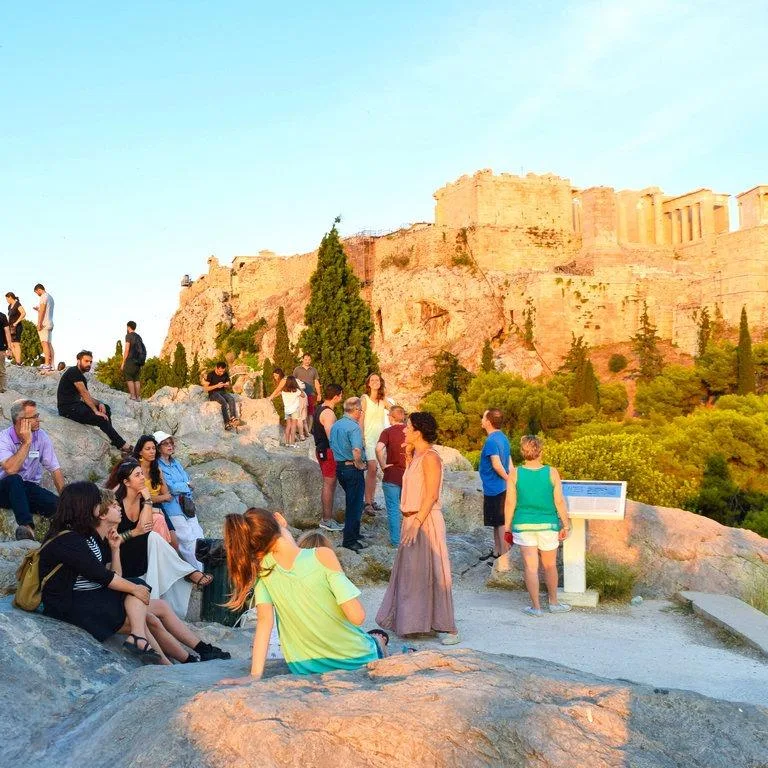
Next, make your way to Mars Hill (Areopagus), a historic site of great significance in the early days of Christianity. It was here that St. Paul delivered his famous sermon on the Christian faith to the people of Athens, as recorded in Acts 17:22. Standing atop this ancient rock, St. Paul addressed the Athenians, proclaiming the truth of the One True God and challenging their belief in multiple deities.
In his sermon, St. Paul skillfully engaged with the intellectuals and philosophers of Athens, using their own cultural references to introduce them to the concept of the Christian God. He spoke of the “Unknown God” to whom the Athenians had erected an altar, and revealed to them that this God was the Creator of the universe and the One who gives life and breath to all things.
Discovering the Heart of Athens
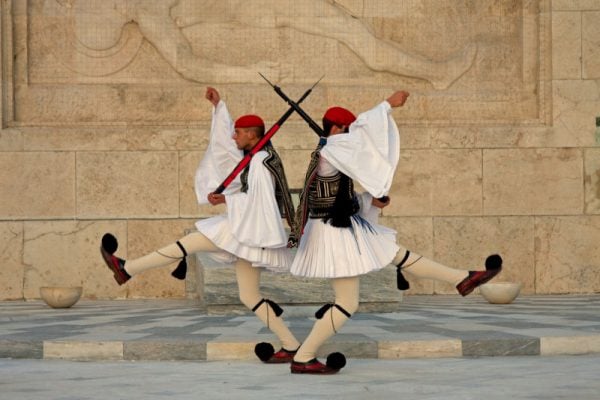
Continue your exploration of Athens by visiting iconic landmarks such as the Tomb of the Unknown Soldier and Constitution Square, home to the prestigious Parliament House. Immerse yourself in the city’s rich history at the Panathenaic Stadium, the site of the first modern Olympics in 1896.
Admire the “Neoclassical Trilogy” – consisting of the Academy, University, and National Library. You’ll also see from outside the impressive Temple of Olympian Zeus and the iconic Hadrian’s Arch.
Exploring the Ancient Agora and Plaka
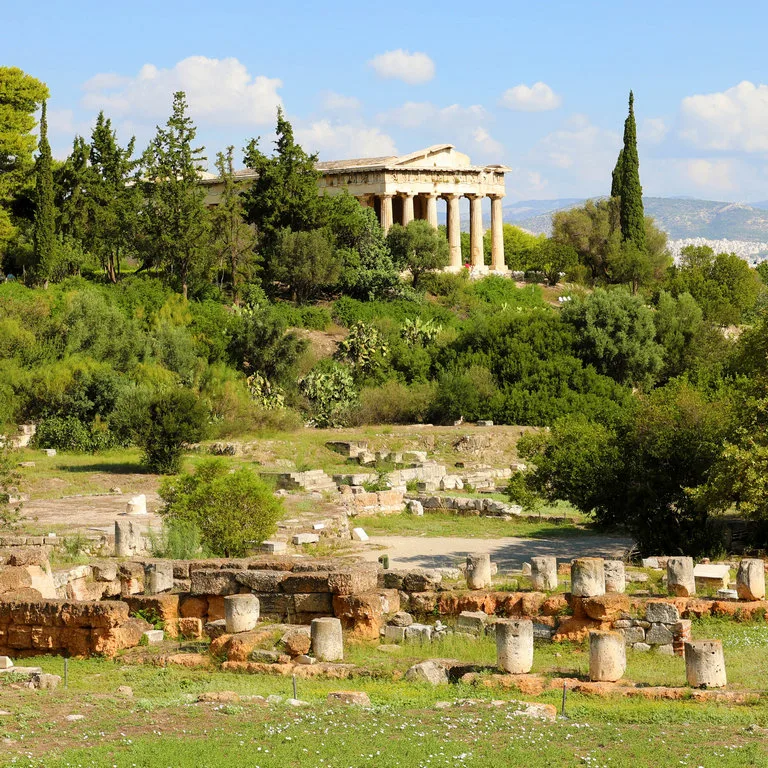
Venture into the charming neighborhood of Plaka, where St. Paul once walked and engaged with his followers in the Ancient Agora. According to historical records, St. Paul spent much of his time in the agora, interacting with locals, sharing ideas, and spreading the message of his new faith. This bustling hub was a pivotal location during St. Paul’s time in Athens, leaving a lasting impact on both the city and his journey through Greece.
Afterward, indulge in a delicious traditional Greek lunch before making your way to the significant city of Corinth.
the Famous Corinth Canal
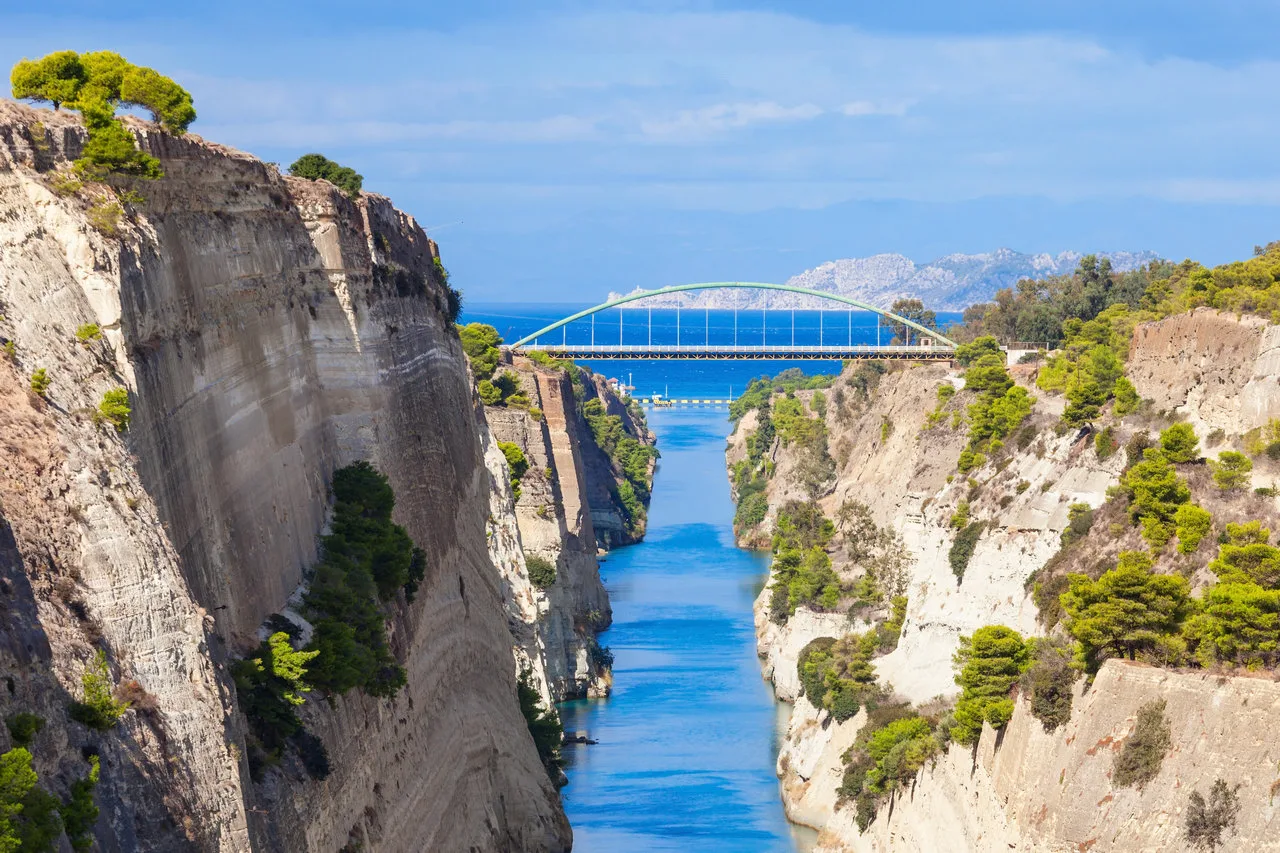
As you travel along the picturesque coastal road of Athens and Attica, you will arrive at the stunning Corinth Canal after about an hour of driving.
Take a moment to capture breathtaking photos of the mesmerizing scenery before continuing on to Ancient Corinth, a significant city-state in ancient Greece that played a crucial role in St. Paul’s travels.
Ancient Corinth: A City of Trade and Transformation
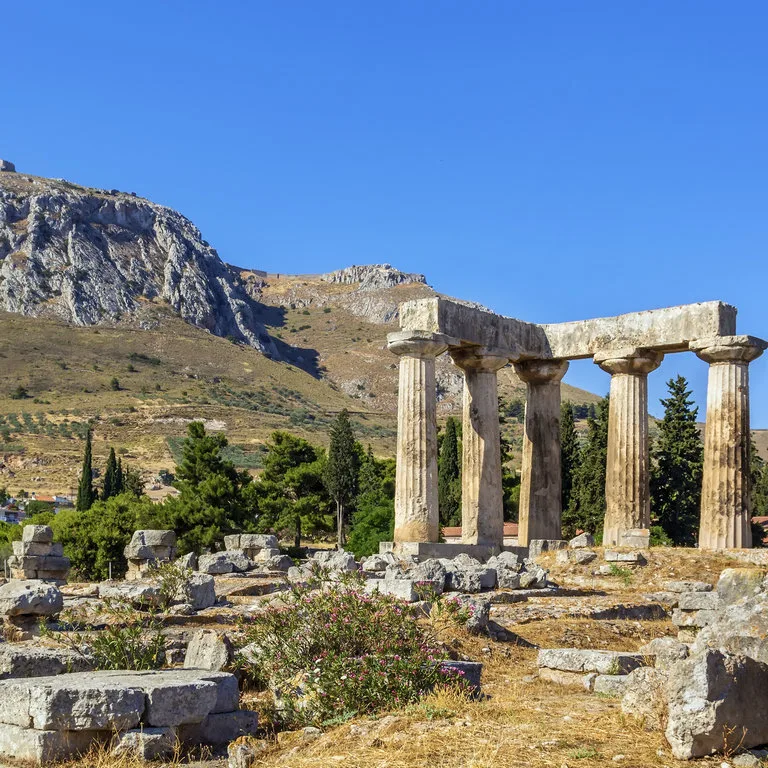
Ancient Corinth was a powerful Greek city known for its wealth, commerce, and culture. Strategically located between mainland Greece and the Peloponnesus, it thrived as a major trade hub. The city was famous for its grand temples, including the Temple of Apollo, and its notorious reputation for immorality.
The Apostle Paul visited Corinth around 50 AD, preaching the Gospel and establishing a Christian community. His letters to the Corinthians, now in the New Testament, addressed issues of faith, unity, and morality. Today, visitors can explore the ruins, including the Bema, where Paul likely stood before the Roman governor Gallio.
Ancient Agora and Museum of Corinth

St. Paul’s Ministry in Ancient Corinth
The Ancient Agora of Corinth was the bustling center of civic, commercial, and religious life. It featured grand stoas, temples, and fountains, serving as a marketplace and meeting space for philosophers, traders, and politicians. Dominating the site was the Temple of Apollo, a striking Doric structure dating back to the 6th century BC. The Bema, a large stone platform, is believed to be where the Apostle Paul was judged by the Roman proconsul Gallio (Acts 18:12-17).
The Archaeological Museum of Ancient Corinth houses artifacts from the city’s Greek, Roman, and Christian periods, including statues, pottery, and inscriptions. Highlights include the stunning Corinthian capitals and a collection of objects related to everyday life, revealing Corinth’s rich and diverse history.
The House of Aquila and Priscilla (Today the Church of St. Paul) in Ancient Corinth
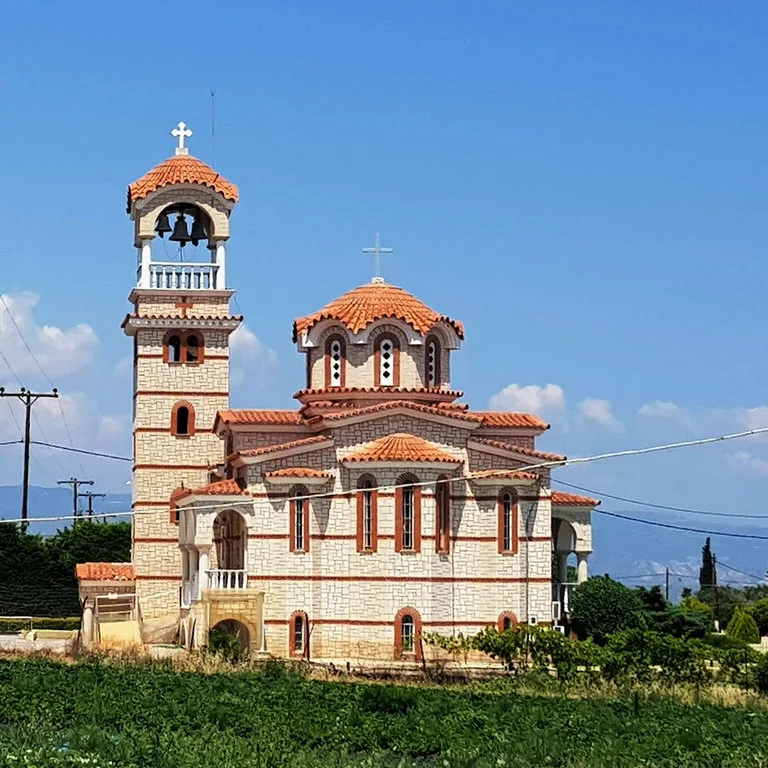
Next, we will visit the church of Saint Paul in Ancient Corinth. Paul joined forces with Aquila and Priscilla to form a thriving community, despite facing numerous challenges that led him to write at least four passionate letters. It was here in Corinth’s agora that Paul faced a trial under Gallio (Acts 18:12-17).
In ancient Corinth, Aquila and Priscilla, a devout Christian couple and close companions of the Apostle Paul, hosted early Christian gatherings in their home. Paul stayed with them during his mission in Corinth (Acts 18:1-3), working together as tentmakers and spreading the Gospel. Their home likely served as one of the first Christian meeting places in the city.
Today, this historic location is the Church of St. Paul, a tribute to the apostle’s presence and teachings in Corinth. This church stands as a symbol of the enduring Christian faith in the city, commemorating the early Christian community that flourished under Paul’s guidance and the hospitality of Aquila and Priscilla.
We’ll conclude our journey with a comfortable drive back to Athens, where you’ll be conveniently dropped off at the cruise ship pier, ready to continue your adventure.
Persons with Disabilities
- Due to uneven surfaces, certain sites are not recommended for persons with walking disabilities or those using a wheelchair.
- Such sites are the Acropolis, the Temple of Poseidon at Sounion, Mycenae, and Delphi
- In all cases, we recommend comfortable flat-solid walking shoes, sunglasses, and sunscreen.
Cruise port meeting
- Pick up and drop off from your ship dock as per the voucher’s instructions, and the indicated time on the voucher.
- Your ship will dock at Terminal A, B, or C. Please walk outside the exit of your designated terminal after disembarking. Our team will meet you there! Look for our team holding a sign that reads ‘PLANETOURAMA’.
- The maximum waiting time will be twenty (15) minutes. If you miss the minibus, please contact the emergency numbers to give you directions on how you meet the group in the city center. You will have to pay the transportation expenses on your own to the city center of Athens.
What you need to know
- We will send you the final instructions for joining our tour a few days prior. Please make sure to check your inbox and Spam folder before your tour.
- The tours are specifically designed for your cruise ship, its docking times, and its passengers. If your ship is delayed, the starting time will be postponed.
- Please note that the entry ticket to the Acropolis is NOT included in the tour price.
- Important Accessibility Information: Visiting the Acropolis requires extensive walking, including climbing 75 steps at the entrance and navigating uneven, slippery marble paths. This can be physically demanding, especially during the summer when crowds are large and temperatures can be high. For those with limited mobility, we recommend following the guide and exploring Areopagus and Herodion instead.
- What to bring with you: Passport or ID, Comfortable shoes, Sunglasses, Sun hat
Included in the Tour
- Pick up and drop off at the cruise ship pier. Optional pickup: Any hotel, accommodation, or central location in the city of Athens and Piraeus.
- Guaranteed return to ship on time
- Modern, comfortable, air-conditioned vehicle
- Professional local English-speaking tour driver/guide
- Semi-Private Small Group: 19 guests for Round-Trip and 15 guests for Embark or Disembark Tour
- Luggage storage (Embark-Disembark Tour): 1 piece of luggage per person. If you have more, please contact us
- Free time for a light fast meal and souvenir shopping
- One complimentary bottle of water per person
- Full refund if your ship cannot dock
Excluded from the Tour
- Entrance fees per person (The Acropolis 30€ per person, the ancient Agora 20€, Ancient Corinth Agora and Museum 20€)
- Lunch in Plaka is optional (Own pay)
- Food and drinks
- Tips are welcome if you enjoy your tour. We recommend 10%
Cancellation Policy
Semi-private tour bookings canceled up to 36 hours before the agreed date and time receive a full refund.
100% cancellation fees apply for any tour bookings canceled within the last 36 hours before the arrival date.
Of course, if for any unforeseen reason, the ship does not dock at the port, then there will be a full refund.
